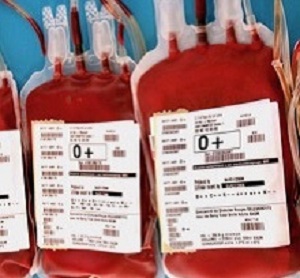 Having a non-O blood group is associated with a higher risk of heart attack, according to a large analysis presented at Heart Failure 2017 and the 4th World Congress on Acute Heart Failure.
Having a non-O blood group is associated with a higher risk of heart attack, according to a large analysis presented at Heart Failure 2017 and the 4th World Congress on Acute Heart Failure.
Lead author Tessa Kole, a Master’s degree student at the University Medical Centre Groningen, the Netherlands, said: “It has been suggested that people with non-O blood groups (A, B, AB) are at higher risk for heart attacks and overall cardiovascular mortality, but this suggestion comes from case-control studies which have a low level of evidence. If this was confirmed it could have important implications for personalised medicine.”
The current study was a meta-analysis of prospective studies reporting on O and non-O blood groups, and incident cardiovascular events including myocardial infarction (heart attack), coronary artery disease, ischaemic heart disease, heart failure, cardiovascular events and cardiovascular mortality.
The study included 1 362,569 subjects from 11 prospective cohorts, described in nine articles. There were a total of 23,154 cardiovascular events. The researchers analysed the association between blood group and all coronary events, combined cardiovascular events, and fatal coronary events.
The analysis of all coronary events included 771,113 people with a non-O blood group and 519,743 people with an O blood group, of whom 11 437(1.5%) and 7,220 (1.4%) suffered a coronary event, respectively. The odds ratio (OR) for all coronary events was significantly higher in carriers of a non-O blood group, at 1.09 (95% confidence interval [CI] of 1.06–1.13).
The analysis of combined cardiovascular events included 708 276 people with a non-O blood group and 476 868 people with an O blood group, of whom 17 449 (2.5%) and 10 916 (2.3%) had an event, respectively. The OR for combined cardiovascular events was significantly higher in non-O blood group carriers, at 1.09 (95% CI 1.06–1.11).
The analysis of fatal coronary events did not show a significant difference between people with O and non-O blood groups.
“We demonstrate that having a non-O blood group is associated with a 9% increased risk of coronary events and a 9% increased risk of cardiovascular events, especially myocardial infarction,” said Kole.
The mechanisms that might explain this risk are under study. The higher risk for cardiovascular events in non-O blood group carriers may be due to having greater concentrations of von Willebrand factor, a blood clotting protein which has been associated with thrombotic events. Further, non-O blood group carriers, specifically those with an A blood group, are known to have higher cholesterol. And galectin-3, which is linked to inflammation and worse outcomes in heart failure patients, is also higher in those with a non-O blood group.
Kole said: “More research is needed to identify the cause of the apparent increased cardiovascular risk in people with a non-O blood group. Obtaining more information about risk in each non-O blood group (A, B, and AB) might provide further explanations of the causes.”
She concluded: “In future, blood group should be considered in risk assessment for cardiovascular prevention, together with cholesterol, age, sex and systolic blood pressure. It could be that people with an A blood group should have a lower treatment threshold for dyslipidaemia or hypertension, for example. We need further studies to validate if the excess cardiovascular risk in non-O blood group carriers may be amenable to treatment.”
Abstract
Introduction: It has been suggested that carriers of non-O blood groups (ABO groups A, B, and AB) have higher cardiovascular (CV) risk, including risk for myocardial infarction (MI), stroke, heart failure and CV death. However, this assumption is mainly based on case-control studies, which showed a skewed blood group distribution in subjects with CV events, but have a low level of evidence.
Methods: We performed a meta-analysis of prospective studies reporting on blood group and CV events. We searched for terms "ABO blood group" and "myocardial infarction, coronary artery disease, ischemic heart disease, heart failure, stroke, cardiovascular events, cardiovascular mortality and all-cause mortality", and initially retrieved 531 articles. After exclusion of studies with diseased subjects and studies with inappropriate CV endpoints, 9 articles describing 11 prospective cohorts, that reported on CV morbidity and mortality in both O and non-O blood groups, remained.
Results: The total number of subjects included in all studies was 1,362,569, and they experienced 23,154 CV events. The odds ratio’s (OR, with 95% Confidence Intervals, CI) for subjects having non-O blood groups compared to O blood group for fatal coronary events, all coronary events and combined CV events were 1.00 (CI 0.85-1.18; p-value: 0.98), 1.09 (CI 1.06-1.13; p-value: <0.00001) and 1.09 (CI 1.06-1.11; p-value: 0.006), respectively. Several sensitivity analyses did not materially change the results.
Conclusion: Our meta-analysis shows that subjects carrying non-O blood group have an increased risk of (nonfatal) CV events, especially myocardial infarction. Underlying mechanisms may vary, although this increased risk has been attributed to a higher concentration of von Willebrand factor and dyslipidemia in subjects with non-O blood group. Further studies should address if the excess CV risk of non O blood group is amenable to treatment.
Authors
TM Kole, N Suthahar, K Damman, RA De Boer
[link url="https://www.escardio.org/The-ESC/Press-Office/Press-releases/non-o-blood-groups-associated-with-higher-risk-of-heart-attack?hit=wireek"]ESCardio material[/link]
[link url="http://spo.escardio.org/SessionDetails.aspx?eevtid=1226&sessId=21246&subSessId=0&searchQuery=%2Fdefault.aspx%3Feevtid%3D1226%26days%3D%26topics%3D%26types%3D%26rooms%3D%26freetext%3DABO%2Bblood%2Bgroup%26sort%3D1%26page%3D1%26showResults%3DTrue%26nbPerPage#.WQgtSMaxXIU"]Heart Failure 2017 abstract[/link]
